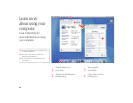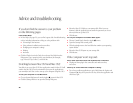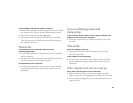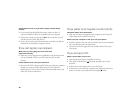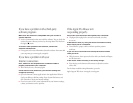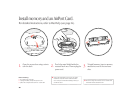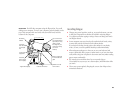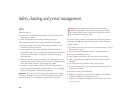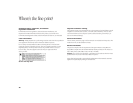The guidelines in this section can help you work more comfortably with
your computer. For detailed information about ergonomics,
see Apple’s Environmental Health and Safety Web site at
www.apple.com/about/ergonomics
Keyboard
m When you use the computer keyboard, your shoulders should be
relaxed. Your upper arm and forearm should form an approximate
right angle, with your wrist and hand in roughly a straight line.
m Yo u may have to raise your chair so your forearms and hands are at the
proper angle to the keyboard. If this makes it impossible to rest your
feet flat on the floor, you can use a footrest with adjustable height and
tilt to make up for any gap between the floor and your feet. Or you may
lower the desktop to eliminate the need for a footrest. Another option
is to use a desk with a keyboard tray that is lower than the regular work
surface.
m Use a light touch when typing and keep your hands and fingers relaxed.
Avoid rolling your thumbs under your palms.
Mouse
m Position the mouse at the same height as your keyboard. Allow
adequate space to use the mouse comfortably.
Chair
m An adjustable chair that provides firm, comfortable support is best.
Adjust the height of the chair so your thighs are horizontal and your
feet flat on the floor.
m The back of the chair should support your lower back (lumbar region).
Follow the manufacturer’s instructions for adjusting the backrest to fit
your body properly.
Computer
m Arrange the computer so the top of the screen is slightly below your
eye level when you’re sitting at the keyboard. The best distance from
your eyes to the screen is up to you, although most people seem to
prefer 18 to 28 inches (45 to 70 cm).
m Position the computer to minimize glare and reflections on the screen
from overhead lights and windows.
32
Work more comfortably.





